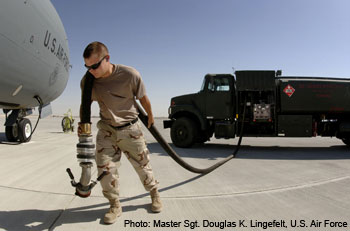Congress Continues Military Program to Use Advanced Fuels
Pew applauds lawmakers who defended key provision
 Phyllis Cuttino, director of the Pew Project on National Security, Energy, and Climate, issued the following statement in reaction to passage of the National Defense Authorization Act and the Omnibus Appropriations Act.
Phyllis Cuttino, director of the Pew Project on National Security, Energy, and Climate, issued the following statement in reaction to passage of the National Defense Authorization Act and the Omnibus Appropriations Act.
"Today, Congress preserved a provision that increases the military's energy independence and bolsters the advanced biofuels industry. We commend the members who defended this policy in service of our nation's security.
After numerous attempts to repeal Section 526, a provision of law that encourages development and deployment of advanced biofuels, Congress passed the annual defense authorization and omnibus spending bills with the provision intact. This action will help make America more secure and protect the Department of Defense from oil price shocks.
Section 526 of the 2007 Energy Independence and Security Act requires federal agencies to purchase fuels that are cleaner than conventional petroleum. Since its implementation, this law has facilitated development of domestically produced advanced biofuels that can power jets, ships, and other tactical vehicles. These ‘drop-in' fuels require no changes to existing engines, provide the same level of performance, and are produced from organic matter such as algae, oilseed plant camelina, and sawgrass. As a result of Section 526, the Department of Defense is playing a critical role in developing, testing, and deploying advanced biofuels.”
Background on Advanced Biofuels Development in the Department of Defense
The development of advanced biofuels is a priority for the Department of Defense, which, as one of the largest institutional energy consumers, uses more than 300,000 of barrels of oil a day. Last year, the Pentagon spent $11 billion on “operational” energy or fuel. Due to volatile global markets, an increase of $10 in the price of a barrel of oil translates into an additional $1.3 billion a year in energy costs for the Pentagon.
The Air Force has tested and certified nearly its entire fleet and aims to obtain 50 percent of its domestic aviation needs from these new sources. By 2016, the Navy plans to obtain 50 percent of its fuels from non-petroleum based blends and to demonstrate a “Great Green Fleet.” Commercial aviation companies, including United Airlines and Alaska Airlines, also have flown demonstration flights using advanced biofuel blends.
The Department of Defense and veterans across the country supported the preservation of Section 526. Between 2003 and 2007, more than 3,000 service men and women and supporting contractors were killed or wounded in attacks on fuel convoys. Advanced biofuels serve the military's mission by helping to reduce costs, enhance security, and fuel the Air Force and Navy in the future. Retaining Section 526 also sends a powerful signal to investors and business interests and supports future economic and technology development.






